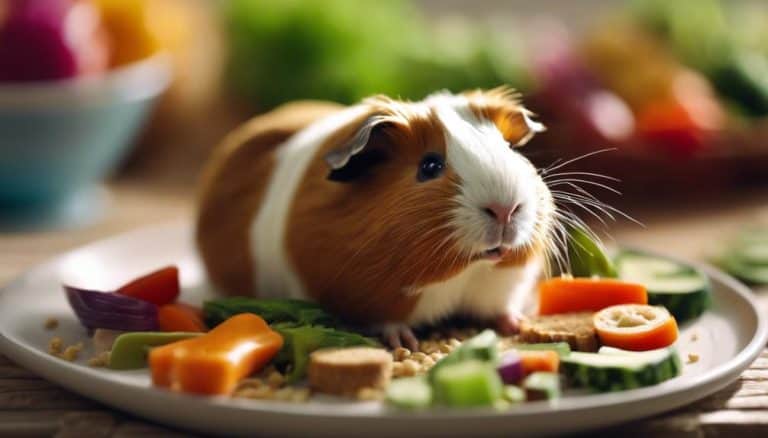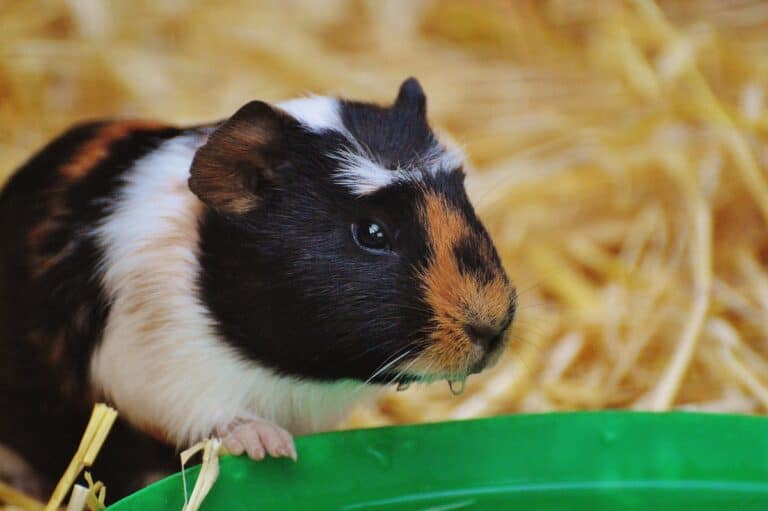How Guinea Pigs Can Safely Eat Oranges: A Guide
Coincidentally, have you ever wondered if oranges are a safe treat for your guinea pig?
Discovering how guinea pigs can safely enjoy oranges involves a few crucial considerations that can impact their well-being.
Understanding the proper way to introduce this fruit into their diet is essential for maintaining their health and happiness.
Benefits of Oranges for Guinea Pigs
Oranges offer guinea pigs a valuable source of Vitamin C, crucial for preventing scurvy and maintaining optimal immune function and overall health. Vitamin C is an essential nutrient that guinea pigs can’t produce on their own, making it vital to provide it through their diet.
Citrus fruits like oranges are a tasty way to ensure guinea pigs meet their Vitamin C requirements. This nutrient plays a significant role in supporting their immune system, helping them fight off illnesses and stay healthy.
Additionally, oranges contain calcium and potassium, which are beneficial for guinea pigs’ heart and muscle function. Including oranges in moderation as part of their balanced diet can offer nutritional benefits and add variety to their meals.
Proper Amount of Oranges for Guinea Pigs
When considering the dietary needs of guinea pigs, it’s essential to carefully regulate the amount of oranges they consume to ensure their overall well-being and health. Guinea pigs can eat one small orange segment as a treat once or twice a week. It’s important to feed oranges in moderation to prevent health issues related to excessive sugar intake.
When offering oranges to guinea pigs, make sure to remove any seeds from the orange segment before feeding it to them. Balancing orange consumption with other Vitamin C-rich foods is crucial as Vitamin C is an essential nutrient for guinea pigs. While orange flesh is safe for guinea pigs to eat, it’s recommended to avoid offering the white part between segments as it may not be well digested by them.
Risks of Feeding Oranges to Guinea Pigs

Regularly feeding guinea pigs oranges can pose various risks to their health and well-being if not carefully monitored and controlled. Oranges have a high sugar content that can lead to mouth sores, upset stomach, and digestive issues in guinea pigs if consumed excessively. While oranges provide essential vitamin C, overfeeding can impact teeth and weight management in these small pets.
Additionally, guinea pigs need calcium in their diet, but too much calcium from oranges can cause painful bladder and kidney stones. It’s crucial to balance their vitamin C intake with other sources and not rely solely on oranges. Moreover, feeding guinea pigs large chunks of oranges can present a choking hazard, so it’s important to cut the fruit into small, manageable pieces.
To prevent potential health complications, oranges should be offered sparingly as a treat, and vitamin C supplements should be considered under veterinary guidance to maintain your guinea pig’s overall health.
How to Introduce Oranges to Guinea Pigs
When introducing new foods like oranges to guinea pigs, it’s crucial to proceed gradually to monitor their digestive response and ensure their well-being. Here are some essential steps to safely introduce oranges to your guinea pigs:
- Start Small: Begin by offering a small portion of orange to your guinea pigs to see if they show interest and tolerate it well. This approach helps prevent any sudden adverse reactions or digestive issues.
- Monitor Closely: Watch your guinea pigs closely after introducing oranges into their diet. Look for any signs of discomfort, such as bloating or diarrhea, which could indicate that oranges may not agree with them.
- Occasional Treat: Treat oranges as an occasional snack rather than a primary food source. While oranges are a good source of vitamin C, their high acidity may not be suitable for all guinea pigs. It’s important to maintain a balanced diet with a variety of fruits and vegetables alongside oranges for optimal nutrition and overall health.
Alternative Treats for Guinea Pigs

To diversify your guinea pigs’ diet and cater to their individual preferences, consider offering alternative treats such as red bell peppers, cucumber, parsley, and a variety of fruits and vegetables.
Red bell peppers are rich in Vitamin C, making them a great option to prevent dietary deficiencies in guinea pigs. Providing a mix of fruits and vegetables ensures they receive essential nutrients while also satisfying their taste preferences.
Some guinea pigs may not fancy oranges as treats, so offering alternatives like cucumber or parsley can be a delightful change for them. By observing their reactions to different options, you can determine their favorite treats and tailor a balanced diet accordingly.
Conclusion
In conclusion, offering oranges to guinea pigs can provide essential Vitamin C, but it’s crucial to do so in moderation and with caution due to their high sugar content.
By following proper feeding practices, monitoring their reactions, and ensuring a balanced diet, guinea pigs can enjoy the occasional treat of oranges safely.
Consulting with a vet for dietary guidance and exploring alternative treats can further enhance their well-being and happiness.







